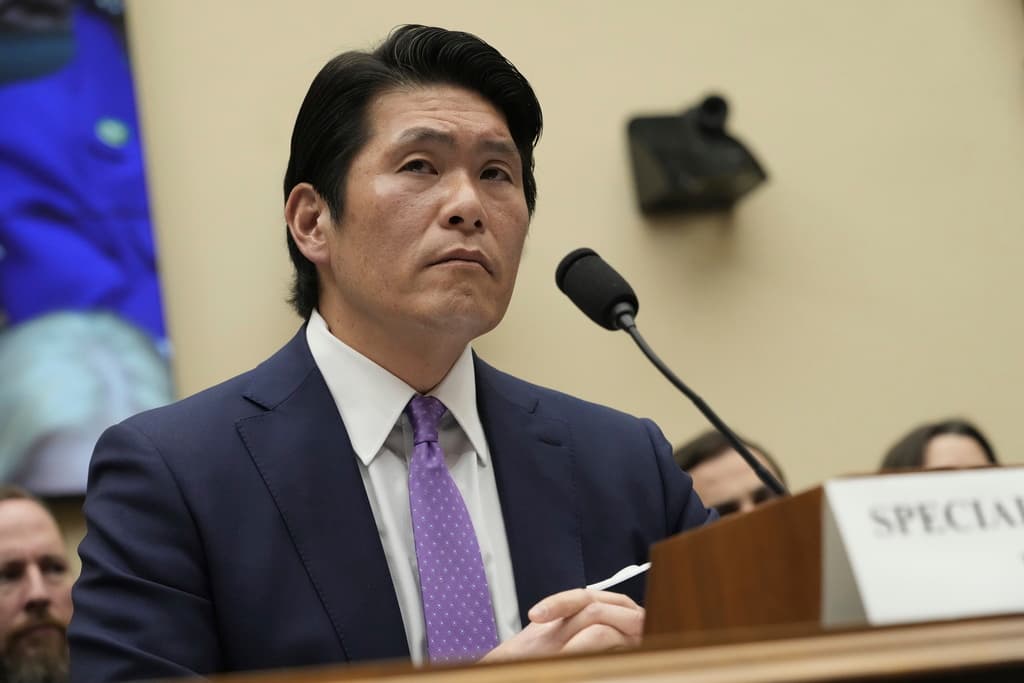DOJ Refuses To Turn Over Audio Recording of Biden’s Interview With Special Counsel, Claiming GOP’s Request Is Political
The department did turn over the transcript of the special counsel’s interview with President Biden’s ghostwriter.

The Department of Justice is refusing to turn over the audio recordings of a special counsel’s interview with President Biden, which has garnered much attention since the investigator determined the president was not mentally fit to stand trial despite “willfully” retaining classified documents.
Special Counsel Robert Hur, who served as a United States attorney under President Trump, was appointed by Attorney General Garland to conduct the investigation into Mr. Biden’s mishandling of classified information.
In a letter to the chairman of the House Judiciary and Oversight committees — Congressmen Jim Jordan and James Comer, respectively — a justice department official said Congress has no right to hear the audio files. Instead, House Republicans should be happy they have already received a transcript of the interview.
“Our efforts at cooperation prove that we are, and continue to be, willing to do our part to show the American people that the officials who serve them can work together productively,” the assistant attorney general for legislative affairs, Carlos Uriarte, says.
House investigators have been anxious to listen to the audio due to disagreements, after the transcript was made public, over whether Mr. Biden exhibited the signs of dementia that Mr. Hur described. The special counsel’s withering assessment of Mr. Biden’s mental acuity has been seen by some as damaging to the president’s re-election campaign.
Messrs. Jordan and Comer previously threatened to hold Mr. Garland in contempt of Congress, which would not be prosecuted under a Biden administration. The criminal referral could, though, be picked up by President Trump’s justice department should he retake the presidency in November.
Mr. Uriarte says the “escalation and threats of criminal contempt” will not lead to a release of the interview audio. “We are therefore concerned that the Committees are disappointed not because you didn’t receive information, but because you did. We urge the Committees to avoid conflict rather than seek it,” he writes.
Mr. Uriarte points out that Mr. Hur himself testified before the Judiciary Committee about his investigation, which he argues is more than enough.
The House committees — which are leading the ongoing impeachment inquiry into the president — have said that they need to review the audio of Mr. Biden’s interview with Mr. Hur because they are “concerned that President Biden may have retained sensitive documents related to specific countries involving his family’s foreign business dealings.”
Mr. Uriarte argues in his letter that the requests for the audio files of the interview are not legitimate, and fall outside of Congress’s oversight powers. He says there is no “constitutionally-based authority to seek conflict for conflict’s sake.”
“The Department is concerned that the Committees’ particular focus on continuing to demand information … may not be in receiving information in service of legitimate oversight or investigatory functions, but to serve political purposes that should have no role in the treatment of law enforcement files,” Mr. Uriarte writes.
The assistant attorney general says that the Biden justice department has been more transparent than any other with respect to special counsel investigations and subsequent congressional reporting. Mr. Uriarte says that at the conclusion of both the 2008 special counsel investigation into the disclosure of the identity of a CIA officer, Valerie Plame, and the 2019 report by Special Counsel Robert Mueller, the justice departments turned over heavily redacted reports and mere summaries of witness interviews.
Mr. Uriarte also says turning over the audio files would be detrimental to prosecutors’ ability to secure recorded interviews in the future.
“The Committees have already received the extraordinary accommodation of the transcripts, which gives you the information you say you need,” he says. “To go further by producing the audio files would compound the likelihood that future prosecutors will be unable to secure this level of cooperation. They might have a harder time obtaining consent to an interview at all.”
The justice department has agreed to turn over the transcript of Mr. Hur’s interview with the president’s ghostwriter, Mark Zwonitzer, who has worked with him on both a 2007 memoir and a book after his vice presidency. Mr. Hur concluded that Mr. Zwonitzer was granted access to classified documents related to America’s war in Afghanistan, even though he did not have the proper security clearances.

